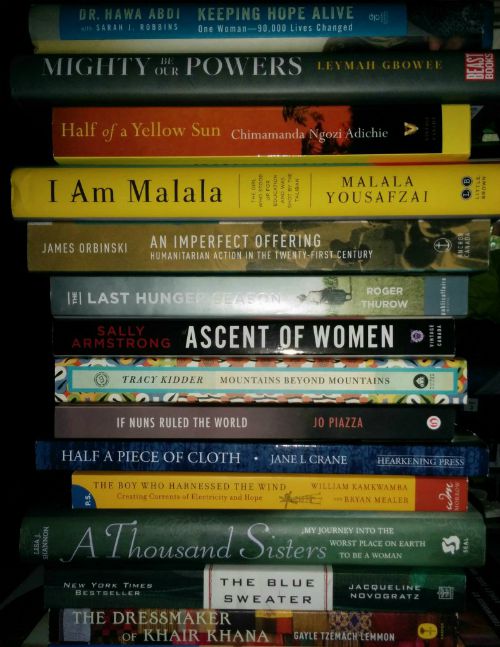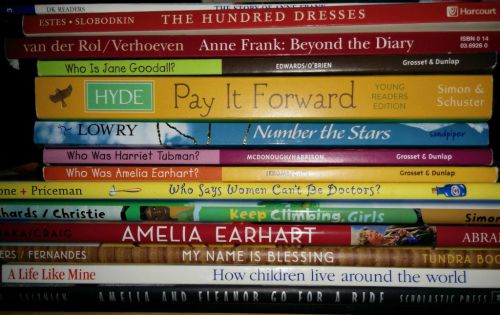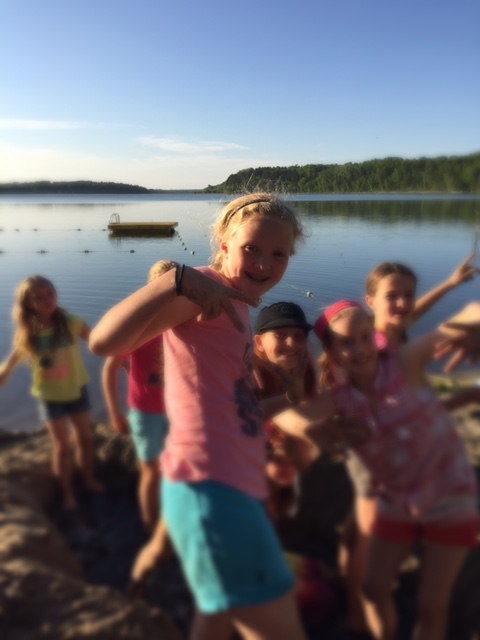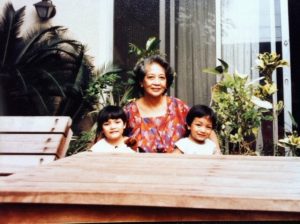
by Nadege Nicoll | Jul 14, 2015 | 2015, Boys, Caring, Childhood, Communication, Family, Kids, Life Lesson, Motherhood, Nadege Nicoll, Parenting, World Motherhood, Younger Children

Sometimes, being kind hearted can bite you in the butt, you know. I’m not advocating to not be kind. But just be aware that sometimes, you get more than the satisfaction of having helped a cause. You get a nagging child who won’t let you be until you surrender. (more…)
Nadege Nicoll was born in France but now lives permanently in New Jersey with her family. She stopped working in the corporate world to raise her three children and multiple pets, thus secretly gathering material for her books. She writes humorous fictions for kids aged 8 to 12. She published her first chapter book, “Living with Grown-Ups: Raising Parents” in March 2013. Her second volume in the series just came out in October 2013. “Living with Grown-Ups: Duties and Responsibilities” Both books take an amusing look at parents’ inconsistent behaviors, seen from the perspective of kids. Nadege hopes that with her work, children will embrace reading and adults will re-discover the children side of parenthood. Nadege has a few more volumes ready to print, so watch this space…
More Posts - Website
Follow Me:



by Alison Fraser | Jul 7, 2015 | Advice, Africa, Canada, Childhood, Education, Family, Girls, Global Citizenship, Humanity, Poverty, Social Good, World Voice

I am an avid reader, especially during the summer months, reading outside each evening with my daughters under the stars on our back porch. I go back and forth between fiction and non-fiction, between heart-wrenching and laugh out loud funny, and between popular bestsellers and hidden gems. So, I thought I would share my meaningful reads list for this summer. These are most often the hidden gems that aren’t featured on lists of number one hits but are just as good, if not better, than those popular reads.
I won’t go into detail about plots and story-lines, but will say that each of these books was a page turner that left me pondering what I had read for weeks after.
If I had to pick a favourite, I would decline…it would be too difficult. But, if I had to pick one that resonated the most with me, it would be “If Nuns Ruled the World”.
Being a Catholic myself, I have always felt that nuns were never given the credit they deserved for the work they were doing throughout the world. We all know of Mother Theresa and her work with the sick, lonely and poor, but not much more is known of nuns working in this day and age. We often hear stories of the Pope and those of the Vatican, but what about those hard-working nuns who are on the ground changing lives every single day in the most adverse of conditions???
This book features the incredible stories of nuns who have taken chances, gone against protocol, helped those that others had given up on, and did it all under the watchful eye of many who disapproved of their work. These nuns are courageous, spunky, lively, funny and most of all, selfless and good-hearted.
I was so inspired by their stories that I wrote to a few of them to let them know….and they wrote me back!
I can honestly say that if the nuns who were featured in this book, really did rule the world, it would be a world of peace, justice, love, acceptance and empathy.
When my three young daughters saw me compiling this list, they too wanted to be involved. They hurried to find their favourite meaningful reads and have compiled them here as well:

Quynn, who is 8, loves the book “Who Says Women Can’t Be Doctors” and has wanted to become a doctor ever since.
Camryn, who is 10, loves the “Who is/was…” series. She has read about Jane Goodall, Hellen Keller, Eleanor Roosevelt, Harriet Tubman and Amelia Earhart, to name just a few. Wanting to be a pilot, she especially loves all books about Amelia Earhart.
Ryleigh, who is 11 loves to read about Anne Frank and anything related to the Holocaust. She read “Number the Stars” in two days and has not stopped talking about it. It is so hard for her to wrap her young mind around the stories of girls her age who survived such atrocities in our history.
So, if you are looking for some great books to read this summer, we hope that you will enjoy some of our recommendations. And, if you have suggestions for us, we would love to hear those as well!
What is on your summer reading list?
This is an original post written for World Moms Blog by Alison Fraser who is founder of the non-profit Mom2MomAfrica.
Alison Fraser is the mother of three young girls ranging in age from 5 to 9 years old. She lives with her family in Cambridge, Ontario, Canada. Alison works as an Environmental Toxicologist with a human environment consulting company and is an active member of the Society of Environmental Toxicology and Chemistry (SETAC). She is also the founder and director of the Canadian Not for Profit Organization, Mom2Mom Africa, which serves to fund the school fees of children and young women in rural Tanzania. Recently recognized and awarded a "Women of Waterloo Region" award, Alison is very involved in charitable events within her community including Christmas Toy and School Backpack Drives for the local foodbank.
More Posts - Website
Follow Me:



by Mannahattamamma (UAE) | Jul 2, 2015 | 2015, Childhood, Feminism, Global Citizenship, Government, Health, Human Rights, International, Motherhood, Newborn Health, Poverty, Save The Children, UAE, USA, World Motherhood

Save The Children
There are some causes that are tricky to rally people around: not everyone wants to ban fur coats, for instance; not everyone thinks that restaurants should post calorie counts on their menus. There are other causes, though, that seem pretty much no-brainers: access to clean water, for instance. Is anyone really going to say “yeah, dirty water, I’m a big fan!” Or saving children. Is anyone really going to say (publicly, anyway) that it’s not a good idea to save children?
Even if we all agree that children should be saved, however, we know that all over the world there are children who need saving, in places where governments and infrastructure don’t seem capable of doing what needs to be done. That’s where organizations like Save the Children step in: they help stitch together the services that can help families survive and give governments a much needed hand.
Save the Children came out with its annual “State of the World’s Mothers” list, which uses five metrics to determine where it’s good to be a mother (and a child). The metrics – maternal health, children’s well-being, educational status (of mothers), economic status, and political status— are combined to give an overall score, which determines where a country falls on the list. Of 179 countries, there are the usual suspects at the bottom of the list—countries where war, natural disasters, and poverty combine in a perfect storm of catastrophe: places like Haiti, or Sudan, or Pakistan.
But there are surprises, too, like the fact that the United States doesn’t even crack the top twenty. Nope, the good ol’ US of A pulls in at 33.
Thirty-third in the world, for a country whose overall wealth and education trumps pretty much everywhere else. The US was beaten by, among others, Slovenia, Belarus, Croatia, and the Czech Republic, as well as all those Scandinavian countries that consistently outperform everyone else when it comes to quality of life issues.
You know what most of these places have that the US does not? A significantly higher percentage of women in government. I suppose a statistician would say that fact is not causal but correlative, and I’m sure that some people would insist that just having women in government won’t automatically make things better for women and children (and thus society), but maybe we should try, and then see what happens?
I live at the moment in Abu Dhabi, in the United Arab Emirates, another wealthy country that doesn’t crack the top twenty on this list. I suppose that for many Westerners, it might seem impossible any Middle Eastern country would score well on a list having to do with women’s lives, but the statistics on this list might help defuse those stereotypes. According to this index, 17.5% of seats in UAE government organizations are held by women, compared to 19.5% in the US; in terms of lifetime risk of maternal death, it is better to be a woman in the UAE: 1 in 5800 versus 1 in 1800 in the US. Women in the US average about 16 years of schooling, women in the UAE about 13; and women in the US tend to be wealthier than women in the UAE (53K for the US, 38K for the UAE).
The Save the Children list doesn’t index maternity leave policy, but that offers another interesting point of comparison.
Women in the UAE only receive 45 days of maternity leave, which isn’t enough, obviously, as any woman who has given birth understands. Women in the US get twelve weeks of maternity leave (although I had to call it “disability” leave in order to ensure that I got the requisite number of days). Twelve weeks, that is, of unpaid leave. John Oliver brilliantly skewered this policy on Mother’s Day, pointing out that the United States aligns with Papua, New Guinea, as the only two countries in the world with no paid parental leave policy. In the UAE, if a woman has a medical certificate that attests to her need for more time at home, she can take up to 100 days of additional (unpaid) leave.
Organizations like Save the Children do invaluable, back-breaking work among desperate populations, but their work raises a question that those of us who live with more privilege should be asking–loudly–of ourselves and our communities: why aren’t we all tied for first place? What has to happen to force “resource-rich” countries take care of its most vulnerable citizens? Why aren’t we doing better?
Where does your country rank in this list? And how do you think your country can do better? Any thoughts?
This is an original post to World Moms Blog by Deborah Quinn in the United Arab Emirates of “Mannahattamamma.”
Photo credit to ‘Save The Children’.
After twenty-plus years in Manhattan, Deborah Quinn and her family moved to Abu Dhabi (in the United Arab Emirates), where she spends a great deal of time driving her sons back and forth to soccer practice. She writes about travel, politics, feminism, education, and the absurdities of living in a place where temperatures regularly go above 110F.
Deborah can also be found on her blog, Mannahattamamma.
More Posts
Follow Me:


by Jennifer Prestholdt (USA) | Jun 30, 2015 | 2015, Childhood, Kids, Life Lesson, World Moms Blog, World Voice, Youth
 I just returned from two weeks in the woods of northern Minnesota. This was my sixth summer reprising my college job as a camp counselor. The opportunity to be at camp at the same time as my three children has allowed me a unique perspective: I get to witness firsthand the benefits of sending my kids to camp.
I just returned from two weeks in the woods of northern Minnesota. This was my sixth summer reprising my college job as a camp counselor. The opportunity to be at camp at the same time as my three children has allowed me a unique perspective: I get to witness firsthand the benefits of sending my kids to camp.
I am proud to work at Skogfjorden, the Norwegian language and cultural immersion program that is one of the fourteen Concordia Language Villages. Respekt is the guiding principle; all deltagere (campers) and staff promise to both have and take responsibility for their actions as part of the Skogfjorden promise. But I am willing to bet that most of the following benefits of sending your kids to sleepaway camp apply to pretty much any high quality summer program.
Kids do things at camp that they may never attempt at home. Being outside of their normal social circle allows kids to try new things. Sometimes this is as simple as a picky eater who samples food at camp that he would flat-out refuse at home. My daughter, for example, barely nibbles the kid-friendly items in her lunchbox but she chows down on almost everything she is served at camp. But sometimes I have seen kids do incredible things that they would never dream of doing at home. I remember a girl in my cabin one year whose parents pulled me aside when they dropped her off to brief me on how incredibly shy she was. And she WAS painfully shy. But exactly one week later, I saw her stand up in front of the entire camp and sing a solo a cappella in the talent show. It was so beautiful that I teared up. Her parents saw a video of it on the camp blog and were. Totally. Blown. Away.
The corollary of this is that kids get to explore different aspects of their personalities at camp.
At school, a kid may be labeled as this, that or the other, but they get a chance to start fresh at camp. At camp, most kids just get to be valued for who they are, without having to worry about how they are viewed by their long-term peers. In fact, two of my three kids kind of don’t want their friends to go to camp with them. It is THEIR place and don’t want to cross the streams of their lives.
Camp helps kids learn how to problem solve and make decisions for themselves. One of the things that I have learned from parenting is that kids actually have very little control over their lives. Understandably, that can be frustrating. In a lot of ways, camp helps children feel in control of what happens to them. At Skogfjorden, kids get to choose between activities twice a day, they choose what they will do during free time, choose how much money they will take out of the bank and what they will buy with it, choose to be kjempenorsk and speak only Norwegian all day. I think that these experiences make kids feel competent and independent, which in the end will help them to be better problem-solvers in any new situation.
And sometimes it can lead to brilliance. One summer, I was assigned to work the camp candy store (or kiosk, as we call it at Skogfjorden). In terms of kid priorities, candy is at the very top of the list. Since the store was only open once a day, the lines were looooong. My oldest son showed up one afternoon and placed a massive and complicated order of soda, chocolate, gummies, etc. He had done the math in his head and paid with exact change for each category of item. I flipped out. “What do you think you are doing? You can NOT have all of that candy!” “Mom,” he responded calmly, “it’s not for me.” Turns out he was running a business. For a small but reasonable fee, he would stand in line for you and buy your candy. Understandably, he had quite a customer base. Not only that, but what he bought for himself he would save until the next morning – when everyone else had eaten up all of their own candy and were desperate for more. Then he would sell at with a steep markup. I gave him $20 at the start of camp on Monday. By Friday, he had doubled his money and started a matching fund for a kid in his cabin who didn’t have much money.
Camp forces kids to take a break from their ever-present technology. Everyone talks about how one of the benefits of sleepaway camp is that today’s plugged-in kids are forced to unplug and commune with nature. That’s true, of course, but it doesn’t capture the sheer beauty of some of the things I have seen at camp. I helped a 7-year-old with her camp evaluation last week and the most important thing for her was that she “had seen more animals than she had in a really long time”. This happened on a day that I saw two deer sprint through camp, as well as a woodchuck, a red-headed woodpecker, and a hummingbird, not to mention all the various insects, birds and bees. (We have bears, too, but that just means you have to sing on your way back to the cabin.) I especially love how the girls in my cabin were constantly showing me the caterpillars, inchworms, moths, shells and frogs that they had discovered.
Speaking of frogs, I have to share the beauty of The Night of the Frogs. It had rained hard – torrentially hard – that day and then cleared off. On my way back to my cabin, I encountered my son Simon and 3 of his buddies in the middle of the flooded path, catching frogs in the moonlight. There were frogs EVERYWHERE – big and small. It was like something out of the Ten Commandments. The boys had already caught more than a dozen frogs of all sizes. Somewhere they had found a cardboard box. They showed me the inhabitants of their cardboard box with pride. They had worked out a system for catching the frogs and their cooperation was yielding enormous success. Sometimes, I just close my eyes and remember their young voices raised in laughter and exhilaration.
Kids benefit from relationships with trusted adults who are NOT their parents. At camp, kids have to create new relationships – on their own, without parental guidance or influence. New friends among their peers are important and perhaps what they will remember most about camp. But the relationships that they forge with trusted adults who are NOT their parents is hugely important. While counselors are not parents, they are more than school-year teachers. They are positive role models who have time and energy to listen, talk, and laugh with our kids. They reinforce the messages and values that we parents are trying to instill, but – unlike us sadly lame parents – THEY are inherently cool. Sometimes kids listen better to these non-parental authority figures who are closer to their age. Parenting is a lot of responsibility and I, for one, feel better knowing that my husband and I am not alone in raising our kids.
Camp helps kids figure out who they are. It helps them to grow up. The truth is that putting a kid in the somewhat uncomfortable situation of living with a lot of other people in a small space helps them learn not only about cooperation and teamwork, but how to respect others and negotiate. This helps kids build confidence, courage, independence, resilience and flexibility.
I sent my two sons off to camp today. They have reached the point in their teen years when they don’t especially need – or want – their mom around when they are at camp. But that’s ok with me. I know that they are in one of the most safe and supportive environments that will ever be in and that they will come home to me the better for it.
This is an original post written for World Moms Blog by Jennifer Prestholdt.
Do your kids go to any sort of summer camp?

Jennifer Prestholdt is a lawyer and the Deputy Director of The Advocates for Human Rights, a volunteer-based human rights organization that works locally, nationally and internationally. Her work in human rights takes her around the world, but she spends most of her time in Minneapolis, MN, where she lives with her children (two sons and one daughter), her husband, an elderly cat and a dwarf hamster.
As Jennifer’s kids are now all in school (1st, 4th and 6th grades), she is finally finding more time to do the things that she used to love to do, especially running, writing and knitting. Jennifer loves to travel and has had the dubious distinction of having been accidentally locked in a bathroom on five continents so far. Australia and Antarctica await!
In January 2011, Jennifer made a New Year’s Resolution to start writing about her experiences in order to share with her children the lessons learned from 15 years of work in human rights. The result is her personal blog, The Human Rights Warrior. The name comes from her son Simon, who was extremely disappointed to learn that his mother is a lawyer, not a warrior.
You can find her on her blog The Human Rights Warrior or on Twitter @Jprestholdt.
More Posts

by Nancy Sumari | Jun 24, 2015 | 2015, Adoptive Parents, Childhood, Nancy Sumari, Step children, Tanzania, World Motherhood

They call me “MZ”
Never in a million years, did i ever think that i would be in a relationship that meant loving and embracing a child that was not my own, as my own. Not that i felt anything against the idea, its just something i never thought of or considered. But that is just how you see it. You have ideas and make plans and then Life happens.
Where did the term ‘step-children’ come from? Why is there a step?
For about four years, my ‘step’ children and I have been in each others lives. It seems like an easy enough relationship whereby i know my boundaries, in manner of not attempting to be their mother, rather a loving figure in their lives. It was a rather difficult relationship to define at first, because well i am not really ‘Auntie’, but yes ‘Dad’s Companion’ and also their sister’s mother.
Eventually they settled for an abbreviation, which i think is pretty cool, MZ they call , from “Mama Zuri.” Sort of like a superhero type? Or close? It feels like it.
And so on and on it goes – this journey of ours. We sometimes have growing pains. It cannot be easy to have someone around who they did not plan for. And this someone playing a role that they did not expect to see me play. But i am thankful and blessed in many ways. It is easy, when they are good kids. There is an occasional discomfort but we paddle through. Like any relationship, it has its ups and downs. But we work at it and it works out. I do not ask for much, other than respect for themselves and others and self discipline. I guess those are simple standards for children everywhere.
The notion of the evil step mother that is perpetrated in history never helps. So there is hesitation in getting close.
But I am confident that the less I think about it and the more love I give, we will get to where we are meant to be, which is in a space of comfort, ease, trust and love.
Do you have any step-children? How is your relationship with them? Any tips to share with the world?
This is an original post by Nancy Sumari from Tanzania. You can find more of her writing at Mama Zuri.
Photo credit to the author.

by Patricia Cuyugan (Philippines) | Jun 4, 2015 | 2015, Awareness, Being Thankful, Celebrations, Childhood, Education, Family, Grandparent, Gratefulness, Happiness, Identity, Inspirational, Life, Life Lesson, Marriage, Memories, Motherhood, Parent Care, Parenting, Philippines, Priorities, Relationships, Responsibility, Siblings, Time, Traditions, Womanhood, World Motherhood

The author and her brother, as children, with their paternal grandmother, Loli.
Among the greatest blessings I have ever had in this life is the time that I have spent with my grandmothers, Loli and Mama. They were two of the greatest women I have ever known.
Loli is my paternal grandmother, and Mama is grandma on my mom’s side of the family. While they are no longer around for me to hug, the lessons and wisdom that both have given me remain in my heart.
Today I share some of these lessons with my fellow world moms:
1. True love DOES exist
My maternal grandparents spent 68 years together before my Mama passed away. Those years of marriage were not perfect, and of course had their share of ups and downs. But on her deathbed, my grandmother opened her eyes and focused on my grandfather, sharing a final moment with him before she left us.
At the end of it all, we knew that there was no one in the world she loved more than him. We could feel that she didn’t want to leave him, and in the end, the assurance that he will be okay was what she needed in order to let go.
I will never forget the way my Mama’s eyes would twinkle each time she looked at my grand dad, how she would laugh at his jokes and hold his hand while they walked. Marriage is hard, but it can be worth it. And true love does exist.
2. Make sure to create memories with your loved ones
In my family, there is no shortage of photographs and stories to turn to when we want to remember fun times. I appreciate these so much more now that I am older.
My grandmothers made sure that we planned something for every occasion, be it Christmas, birthdays, or even random, ordinary Sundays. What mattered was that we made time for each other, and that we made our time together count.
3. Come what may, you can always count on family
There is comfort in knowing that your family will be there for you no matter what happens. We were raised to love one another unconditionally, and to watch each other’s backs. Our grandmothers had our parents make sure that it stayed this way, even as we all grew up.
We now pass these close family ties on to our children, who are not just cousins but also the best of friends. Truth be told, I cannot imagine what life would be like without my siblings and cousins.
4. Allow your children to be spoiled by their grandparents
This one is a tough pill to swallow, and I fought against it for many years with my own son and parents. But looking back, the best memories that I have of my grandmothers were those times I had alone with them, where I was the princess and got whatever I wanted.
When I was pregnant, my Loli would steal extra packs of lunch or save half of her share to bring home to me as treats after her meetings and get-togethers. My Mama indulged me in mini birthday celebrations in her home, complete with spaghetti, ice cream and cake, when I was already in my 30’s!
These are memories that I hold so dear. They have their own happy places in my heart and can never be taken away. Someday, I hope that my son remembers moments with my mom and mom-in-law with the same kind of fondness.
5. At the end of it all, love is what lives on
I’ve had my fair share of scolding and tough love from my grandmothers, but not once in my life did they ever make me feel unloved. I miss them each day, the nagging phone calls, their funny tales from the past, their hugs and kisses.
The love that they left behind lives on in me, and in each of us in the family. It’s what binds us together now and keeps us strong.
Theirs was the kind of motherly love that transcended generations, the kind of love that I, too, hope to give to my family through the years.

The author and her sister with their maternal grandmother, Mama
*In loving memory of Natividad F. “Loli” de Castro (1921-2008) and Presentacion T. “Mama” delos Santos (1929-2015)
This is an original post for World Moms Blog from our contributor in the Philippines, Mrs. C
The images used in this post are attributed to the author.
Patricia Cuyugan is a wife, mom, cat momma, and a hands-on homemaker from Manila, whose greatest achievement is her pork adobo. She has been writing about parenting for about as long as she’s been a parent, which is just a little over a decade. When she’s not writing, you can usually find her reading a book, binge-watching a K-drama series, or folding laundry. She really should be writing, though! Follow her homemaking adventures on Instagram at @patriciacuyugs.
More Posts
Follow Me:














 I just returned from two weeks in the woods of northern Minnesota. This was my sixth summer reprising my college job as a camp counselor. The opportunity to be at camp at the same time as my three children has allowed me a unique perspective: I get to witness firsthand the benefits of sending my kids to camp.
I just returned from two weeks in the woods of northern Minnesota. This was my sixth summer reprising my college job as a camp counselor. The opportunity to be at camp at the same time as my three children has allowed me a unique perspective: I get to witness firsthand the benefits of sending my kids to camp.








